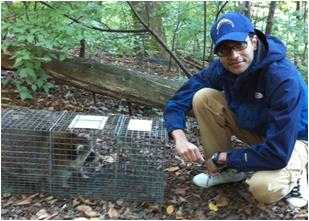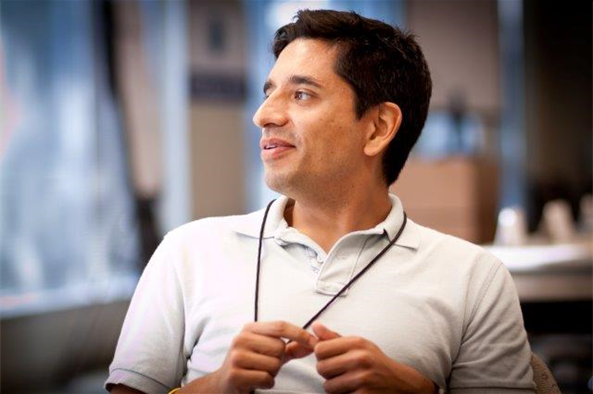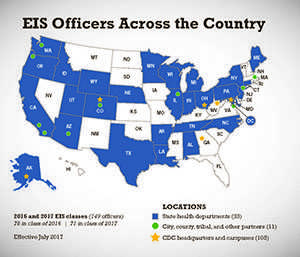CDC's Disease Detectives

For more than 65 years, EIS officers have been ready responders, identifying causes of disease outbreaks, recommending prevention and control measures, and implementing strategies to protect people from injury, disability, illness, and death. CDC’s disease detectives — EIS officers — have significant impact on improving the public’s health. They support more than 100 field investigations each year in the United States and around the world.
EIS is CDC’s 2-year training program in the practice of applied epidemiology. Each year, 70–80 new EIS officers are selected from among hundreds of physicians, doctoral-level scientists, veterinarians, and other health professionals who apply to this competitive fellowship program. EIS officers of all backgrounds receive rigorous on-the-job training, supervision, and mentoring as they provide public health service. For EIS officers, the public is the patient.
“EIS officers not only learn epidemiologic skills, they put those skills to use by serving on the public health frontlines.”
Geoffrey Whitfield, PhD, EIS Class of 2013
The EIS class composition evolves with demographic trends and expanded public health scope. In 1951, 22 physicians and 1 sanitary engineer comprised the first, all-male EIS class. In contrast, the 2015 class consists of 40 physicians, 29 PhD-level scientists, 9 veterinarians, 1 nurse, and 1 physical therapist. Of the 80 new EIS officers, 56 (70%) are female. Ten members of the class are citizens of other countries.
Want to know more about the EIS experience?
Check out the Epidemic Intelligence Service Playlist! EIS alumni talk about how EIS led to their careers and offer advice for potential applicants.
EIS is a gateway to successful careers. Many alumni continue public health careers at CDC, state or local health departments, and other organizations. Many other graduates are leaders in public health, medicine, academia, research, industry, foundations, nongovernmental organizations, and the media.
For example, EIS alumni include:
- Acting Surgeons General
- CDC directors
- CDC center, division, and branch leaders
- Public health and medical school faculty and deans
- Foundation and non-governmental organization executives
- State epidemiologists
- Pharmaceutical and insurance industry executives
- Medical epidemiologists
- State health officials
- Health and medical editors, reporters, and writers

An EIS officer took part in a trap-vaccinate-release campaign against rabies in New York City’s Central Park.
Investigations are a major part of the EIS experience, teaching EIS officers the art and science of when and how to apply epidemiologic strategies to public health problems. Outbreak investigations give EIS officers experience in:
- Developing questionnaires
- Conducting surveys
- Analyzing data
- Tracing contacts
- Identifying causes of disease outbreaks
- Recommending control measures
- Devising strategies to prevent future occurrences
CDC’s disease detectives are often first on the scene when a public health emergency occurs. EIS officers help public health officials investigate and control infectious disease outbreaks, such as Ebola in West Africa, chikungunya virus in the Americas, and foodborne outbreaks in the United States.
Fast Fact
In 2014, EIS officers assigned to state or local health departments conducted 206 epidemiologic investigations in their jurisdictions. Those assigned to CDC or field locations responded to 78 requests for short-term epidemiologic technical support, known as Epi-Aids.
Beyond disease outbreaks, EIS officers respond to natural and industrial events — hurricanes, earthquakes, mudslides, extreme heat or winter weather, and chemical releases — that endanger health and safety.
“From tracking down transplant recipients who received rabies virus–exposed organs to helping discover a brand new species of orthopoxvirus in the country of Georgia, the 2 years I spent as an EIS officer were among the most rewarding in my professional career. You come in each day excited to investigate something new.”
Neil Vora, MD, EIS Class of 2012
CDC may activate its Emergency Operations Center (EOC) to manage the response during a public health emergency. EIS officers support emergency responses, either by working in the field or staffing the EOC (see EIS and the Ebola Response[PDF – 745 KB]). Visit CDC Current Outbreak List to read about the types of investigations that involve EIS officers.

EIS combines experiential and classroom learning.
EIS is a competency-based training program modeled after a traditional medical residency program. EIS officers learn on the job while serving CDC and public health partners. Much of the training occurs through hands-on assignments and mentoring.
EIS officers learn to apply the science of epidemiology to solve public health problems. About 95% of learning is experiential. The remainder occurs via classroom instruction, case studies, exercises, and e-learning.
EIS officers develop presentation skills by attending weekly epidemiology seminars and the annual EIS Conference. At these events, they present findings and answer questions about their investigations and studies. They also meet and learn from fellow officers, CDC epidemiologists, and other leaders in public health and epidemiology, many of whom are EIS alumni.
New EIS officers begin each July with an intensive, 1-month orientation in Atlanta, Georgia. The course covers biostatistics, public health ethics and law, communication and media training, and other broad public health topics.
EIS officers report to their work assignments in August, immediately after the summer course. In late fall, they attend a 1-week course on public health surveillance methods and advanced epidemiologic techniques.
Second-year EIS officers complete additional advanced epidemiologic courses via e-learning.
Core Activities of Learning (CALs)
The EIS program’s competency-based education incorporates prescribed CALs. All EIS officers must complete the CALs, through which they develop proficiency as skilled epidemiologists who can effectively address public health challenges. CALs EIS officers fulfill:
- Conduct or participate in a field investigation of a potentially serious public health problem that requires a timely response
- Design, conduct, and interpret an epidemiologic analysis
- Evaluate a public health surveillance system
- Give a public health talk on original work or field of study
- Give an oral presentation to a scientific audience
- Communicate complex scientific concepts to a nonscientific audience
- Create a visual aid or graphic to illustrate scientific findings
- Write and submit an abstract as first author
- Write and submit a scientific manuscript for a peer-reviewed journal as first author
- Write and submit a concise public health update that communicates timely information as the primary author
- Provide service to the agency
EIS officers work at:
- CDC headquarters in Atlanta or other locations across the United States
- State, local, or territorial health departments
- Partner organizations or agencies
EIS officers may be sent to another location on a temporary assignment. Although an assignment can include international work, no EIS officers are based outside the United States.
Approximately 75% of a new EIS class is assigned to a CDC office. CDC has campuses in the following locations:
- Atlanta, Georgia (headquarters)
- Anchorage, Alaska
- Cincinnati, Ohio
- Fort Collins, Colorado
- Hyattsville, Maryland
- Morgantown, West Virginia
- Pittsburgh, Pennsylvania
- Research Triangle Park, North Carolina
- San Juan, Puerto Rico
- Spokane, Washington
- Washington, DC
The remainder of the class is assigned to public health departments in the United States and its territories, or to other federal agencies or partner organizations. All EIS officers participate in competency-based education and experiential on-the-job training, regardless of their assignment.
“As a field officer, I am able to experience public health from both the federal and state perspectives. I have the opportunity to work in an almost unlimited breadth of topic areas and with professionals with years of experience and varied backgrounds.”
Misha Robyn, DVM, EIS Class of 2014
EIS Officer Assignments
EIS officers are currently assigned to:
- Center for Global Health (CGH)
- National Center for Chronic Disease Prevention and Health Promotion (NCCDPHP)
- National Center for Emerging and Zoonotic Infectious Diseases (NCEZID)
- National Center for Environmental Health and Agency for Toxic Substances and Disease Registry (NCEH/ATSDR)
- National Center for HIV/AIDS, Viral Hepatitis, STD and TB Prevention (NCHHSTP)
- National Center for Immunization and Respiratory Diseases (NCIRD)
- National Center for Injury Prevention and Control (NCIPC)
- National Center on Birth Defects and Developmental Disabilities (NCBDDD)
- National Center for Health Statistics (NCHS) (Hyattsville)
- National Institute for Occupational Safety and Health (NIOSH) (Morgantown, Cincinnati, and Anchorage)
- National Center for Emerging Zoonotic and Infectious Diseases (NCEZID) (Fort Collins)
- Office of Public Health Preparedness and Response (OPHPR)
- State, local, and territorial health departments throughout the United States
- Northwest Portland Area Indian Health Board
- Kaiser Permanente
- Substance Abuse and Mental Health Services Administration
See a map of where EIS officers are assigned at EIS Officers Across the Country [PDF – 1 page].
- Page last reviewed: April 19, 2017
- Page last updated: April 19, 2017
- Content source:



 ShareCompartir
ShareCompartir
